|
Books Should Be Free Loyal Books Free Public Domain Audiobooks & eBook Downloads |
|
|
Books Should Be Free Loyal Books Free Public Domain Audiobooks & eBook Downloads |
|
Literature |
|---|
|
Book type:
Sort by:
View by:
|
By: George Gissing (1857-1903) | |
|---|---|
 Life's Morning
Life's Morning
This is the story of a poor young lady Emily Hood who while working as a governess falls in love with Wilfrid Athel the son of her employer. They become engaged, however things do not run smoothly after a visit home to her parents and Emily has to make a heartbreaking choice. | |
By: Robert Herrick (1591-1674) | |
|---|---|
 Delight in Disorder
Delight in Disorder
Robert Herrick (baptised 24 August 1591 – buried 15 October 1674[1]) was a 17th-century English lyric poet and cleric. He is best known for his book of poems, Hesperides. Herrick never married, and none of his love-poems seem to connect directly with any one beloved woman. He loved the richness of sensuality and the variety of life, and this is shown vividly in such poems as Cherry-ripe, Delight in Disorder and Upon Julia’s Clothes. | |
 Hag
Hag
A poem for Halloween by the 17th century English author Robert Herrick. His poems were not widely popular at the time they were published. His style was strongly influenced by Ben Jonson, by the classical Roman writers, and by the poems of the late Elizabethan era. This must have seemed quite old-fashioned to an audience whose tastes were tuned to the complexities of the metaphysical poets such as John Donne and Andrew Marvell. His works were rediscovered in the early nineteenth century, and have been regularly printed ever since. | |
By: Herbert George Jenkins (1876-1923) | |
|---|---|
 Malcolm Sage, detective
Malcolm Sage, detective
A collection of short stories that chronicles the first year of the Malcolm Sage Detective Bureau. | |
By: Paul | |
|---|---|
 The Sheridan Road Mystery
The Sheridan Road Mystery
A shot rings out in the middle of the night in a quiet Chicago neighborhood. Patrolman Murphy is directed to an apartment where a man says the shot came from. The apartment is locked and apparently empty. Was there a murder here? And if so, where is the victim? | |
By: Stewart Edward White (1873-1946) | |
|---|---|
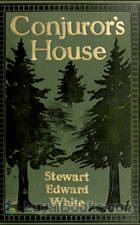 Conjuror's House, a Romance of the Free Forest
Conjuror's House, a Romance of the Free Forest
In the northern outreaches of the Canadian wilderness, it was understood that the Hudson Bay Company governed all trading, and one factor named Galen Albret took his position seriously. Free traders, or those who dared try to do their trading outside of the Company, found themselves having to face Galen Albret and his methods of dealing with them. One or two offenses he might tolerate, but for those who repeatedly refuse to acknowledge his warning out, he would send them on “La Longue Traverse” through the wilderness without supplies, and from which they seldom returned... | |
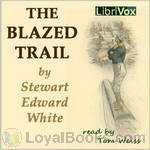 The Blazed Trail
The Blazed Trail
Stewart Edward White wrote fiction and non-fiction about adventure and travel, with an emphasis on natural history and outdoor living. White's books were popular at a time when America was losing its vanishing wilderness and many are based on his experiences in mining and lumber camps. The Blazed Trail is the story of early lumbermen in the northern woods of Michigan. The novel portrays the challenges faced by the workers focusing on one, Harry Thorpe, as he endeavors to be successful though completely unskilled when he enters the woods... | |
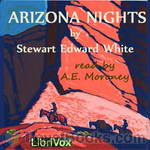 Arizona Nights
Arizona Nights
Arizona Nights is a collection of tales from the American West as told by those who took part in them. | |
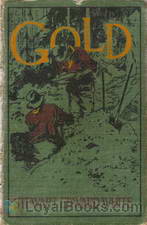 Gold
Gold
This is a well written story of the California gold rush of 1849. Four friends decide they are going to go to California and get rich in the gold fields. Follow their adventures as they travel to California across the isthmus of Panama to San Francisco. In their search for gold they encounter hostile Indians, various desperadoes, and natural disasters. Did they strike it rich? Listen and find out. | |
 Blazed Trail Stories and Stories Of The Wild Life
Blazed Trail Stories and Stories Of The Wild Life
Thirteen short stories by a popular writer of the early 20th century (not to be confused with an earlier book Blazed Trail). White's books were popular at a time when America was losing its vanishing wilderness. He was a keen observer of the beauties of nature and human nature, yet could render them in a plain-spoken style. Based on his own experience, whether writing camping journals or Westerns, he included pithy and fun details about cabin-building, canoeing, logging, gold-hunting, and guns and fishing and hunting... | |
By: Leigh Brackett (1915-1978) | |
|---|---|
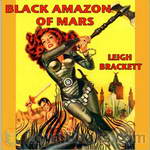 Black Amazon of Mars
Black Amazon of Mars
Carrying out the last wishes of a comrade, mercenary Eric John Stark takes on the task of returning a stolen talisman to a walled city near the Martian pole; a city that guards the mysterious Gates of Death. Now all he has to do is get past the brutal clans of Mekh and the shadowy Lord Ciaran to get to Kushat where they’ll probably attempt to kill him. All while he tries to hold on to a talisman that imprints ancient memories of the Gates in his mind. That’s not easy for a human raised by Mercurian aborigines... | |
By: Marcel Allain (1885-1969) | |
|---|---|
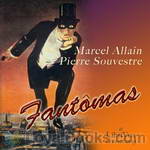 Fantômas
Fantômas
Fantômas is the first of 32 novels penned from 1911 to 1913 by Marcel Allain and Pierre Souvestre. The title character is a ruthless thief and killer, a bloodthirsty successor to LeBlanc's Arsène Lupin. The first five novels were made into silent film serials. The character and the movies caught the eye of the French Surrealists who admired the primal violence of Fantômas, as well as his portrayal in the films, which are considered landmarks in French Cinema. In Fantômas, the Marquise de Langrune is savagely murdered and Inspector Juve, who is obsessed with capturing Fantômas, arrives to solve the murder. | |
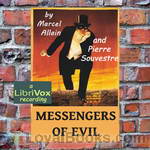 Messengers of Evil
Messengers of Evil
Fantômas was introduced a few years after Arsène Lupin, another well-known thief. But whereas Lupin draws the line at murder, Fantômas has no such qualms and is shown as a sociopath who enjoys killing in a sadistic fashion. He is totally ruthless, gives no mercy, and is loyal to none, not even his own children. He is a master of disguise, always appearing under an assumed identity, often that of a person whom he has murdered. Fantômas makes use of bizarre and improbable techniques in his crimes, such as plague-infested rats, giant snakes, and rooms that fill with sand... | |
By: Kathleen Norris | |
|---|---|
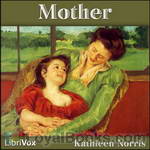 Mother
Mother
With seven children and a home to take care of, Margaret wondered how her Mother could be so happy living a life that seemed all drudgery. As Margaret has new experiences, she comes to realize that “her mother was not only the truest, the finest, the most generous woman she had ever known, but the happiest as well”. | |
By: Barton Wood Currie | |
|---|---|
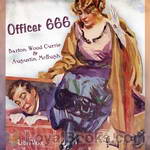 Officer 666
Officer 666
Bored with his life as a wealthy businessman's only son, Travers Gladwin learns of a plot by a renowned art burglar to rob his house, so rather than thwart the planned burglary, he borrows a police uniform from a friend and decides to confront the robber by posing as an officer. When the burglar arrives at the house, he tries to pass himself off as Travers Gladwin. From there, things only get more complicated, including the arrival of the burglar's girlfriend who believes that her beau is the wealthy man's son. Comical and timely, the book was made into a movie multiple times, each hugely successful. | |
By: Clara Reeve (1729-1807) | |
|---|---|
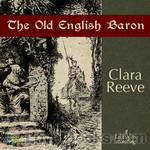 The Old English Baron
The Old English Baron
The story follows the adventures of Sir Philip Harclay, who returns to medieval England to find that the castle seat and estate of his friend Lord Lovel have been usurped. A series of revelations, horrors and betrayals climax in a scene of single combat in which good battles evil for the return of the prize. | |
By: Robert Tressell | |
|---|---|
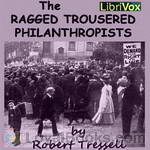 The Ragged Trousered Philanthropists
The Ragged Trousered Philanthropists
Clearly frustrated at the refusal of his contemporaries to recognise the iniquity of society, Tressell’s cast of hypocritical Christians, exploitative capitalists and corrupt councillors provide a backdrop for his main target — the workers who think that a better life is “not for the likes of them”. Hence the title of the book; Tressell paints the workers as “philanthropists” who throw themselves into back-breaking work for poverty wages in order to generate profit for their masters... | |
By: Charles W. Diffin (1884-1966) | |
|---|---|
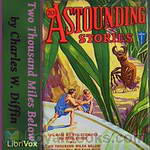 Two Thousand Miles Below
Two Thousand Miles Below
A science fiction novel that was originally produced in four parts in the publication: Astounding Stories in June, September, November 1932, January 1933. The main character is Dean Rawson, who plans on discovering a way of mining power from a dead volcano, but ends up discovering more than he bargained for. | |
By: Ralph Connor | |
|---|---|
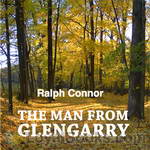 The Man from Glengarry
The Man from Glengarry
With international book sales in the millions, Ralph Connor was the best-known Canadian novelist of the first two decades of the Twentieth Century. The Man from Glengarry was his most popular and accomplished work. Immediately after its publication in 1901, the novel spent several months in the top ranks of the New York Times "Books in Demand" list.We follow the story of Ranald Macdonald, who is shaped by family and community in rural eastern Ontario in the early decades after Canadian confederation... | |
 Glengarry School Days
Glengarry School Days
With international book sales in the millions, Ralph Connor was the best-known Canadian novelist of the first two decades of the Twentieth Century. Glengarry School Days (1902), hugely popular in its time, is based on his memories of growing up in rural Ontario around the time of Canadian confederation. Although Connor saw himself as writing moral fiction for adults, generations of younger readers have also enjoyed these affectionate and gently amusing sketches, and excerpts from Glengarry School Days have appeared in school anthologies. | |
By: Charlotte Mary Yonge (1823-1901) | |
|---|---|
 Heir of Redclyffe
Heir of Redclyffe
The Heir of Redclyffe (1853) was the first of Charlotte M. Yonge's bestselling romantic novels. Its religious tone derives from the High Church background of her family and from her friendship with a leading figure in the Oxford Movement, John Keble, who closely supervised the writing of the book. The germ of its plot was suggested by her friend Marianne Dyson. | |
By: Susan Glaspell (1876-1948) | |
|---|---|
 Lifted Masks
Lifted Masks
In this collection of short stories, Susan Glaspell examines the unique character of America and its people. | |
By: Harold Bell Wright (1872-1944) | |
|---|---|
 The Shepherd of the Hills
The Shepherd of the Hills
The story depicts the lives of mountain people living in the Ozarks and the mystery surrounding an old man called ‘The Shepherd of the Hills,’ who’s called Dad Howitt. The backdrop storyline surrounds the pretty Samantha Lane, called Sammy, and her love of Young Matt, Grant Matthews. The shepherd, an elderly, mysterious, learned man, escapes the buzzing restlessness of the city to live in the backwoods neighborhood of Mutton Hollow in the Ozark hills. | |
By: Eugène Sue (1804-1857) | |
|---|---|
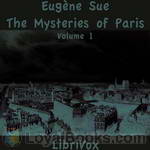 The Mysteries of Paris, Volume 1
The Mysteries of Paris, Volume 1
The Mysteries of Paris (French: Les Mystères de Paris) is a novel by Eugène Sue which was published serially in Journal des débats from June 19, 1842 until October 15, 1843. Les Mystères de Paris singlehandedly increased the circulation of Journal des débats. There has been lots of talk on the origins of the French novel of the 19th century: Stendhal, Balzac, Dumas, Gautier, Sand or Hugo. One often forgets Eugène Sue. Still, The Mysteries of Paris occupies a unique space in the birth of this... | |
By: Mary E. Hanshew (1852-1927) and Thomas W. Hanshew (1857-1914) | |
|---|---|
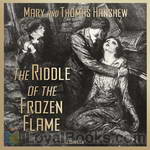 The Riddle of the Frozen Flame
The Riddle of the Frozen Flame
Another full-length mystery story featuring Hamilton Cleek, whom we met first in Cleek: The Man of the Forty Faces. This time, Cleek investigates the sinister disappearance of people and the mysterious appearance of flames at night in the desolate Fens, and his friend Superintendent Narkom of Scotland Yard tries to solve some tricky cases of bank robberies in London.While not quite up to the standard we have come to expect from previous Cleek adventures, it is still quite a jolly romp, and Cleek's cockney sidekick Dollops is always good fun. | |
By: Lady Mary Wroth (1587-1651/3) | |
|---|---|
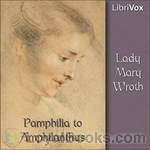 Pamphilia to Amphilanthus
Pamphilia to Amphilanthus
Pamphilia to Amphilanthus is the first sonnet sequence written by an Englishwoman. Published in 1621, the poems invert the usual format of sonnet sequences by making the speaker a woman (Pamphilia, whose name means “all-loving”) and the beloved a man (Amphilanthus, whose name means “lover of two.”). It is possible that Wroth based the story on her own fraught relationship with her cousin, William Herbert. | |
By: Lucia Chamberlain (1882-1978?) | |
|---|---|
 The Other Side of the Door
The Other Side of the Door
It's 1865 in the city of San Francisco. Pretty, young Ellie Fenwick is walking to the market early one morning to surprise her father with some fresh mushrooms. As she passes a gambling house, she hears a gunshot and two young men emerge. One man falls dead on the pavement and the other is Johnny Montgomery, a handsome young man Ellie recognizes from seeing him previously at a dance. Johnny is holding a smoking pistol in his hand. This incident propels the proper young Ellie into a world of prisons and courtrooms as a murder trial unfolds and the fate of Johnny may rest with her testimony... | |
By: Joseph Smith Fletcher (1863-1935) | |
|---|---|
 Orange-Yellow Diamond
Orange-Yellow Diamond
| |
 Talleyrand Maxim
Talleyrand Maxim
John Mallathorpe, a wealthy Yorkshire industrialist and land owner dies in an accident, apparently without making a will. His estate goes to his wife and two children and they live the good life for a number of years. However, an old bookseller, whilst clearing some old books passed on from the Mallathorpe estate, finds a copy of Mallathorpe's will inside one of the books, and unfortunately for the family the will bequeaths the whole estate minus a small endowment for the family, to the city authorities... | |
 Herapath Property
Herapath Property
Jacob Herapath, a wealthy property developer and member of Parliament, is found dead in his office, a revolver at his side and a bullet wound to the head. An allegedly forged Will deepens the mystery. An intriguing puzzle with plenty of twists and turns. | |
 Scarhaven Keep
Scarhaven Keep
The northern English sea coast provides a compelling backdrop for this genre of writing; a mysterious disappearance, a love interest, and plot twists 'se mijotent' to produce an intriguing read. | |
 Rayner-Slade Amalgamation
Rayner-Slade Amalgamation
Marshall Allerdyke is driving through the night from London to Hull in response to an urgent telegram from his cousin. As he nears Hull, a beautiful woman stops his car to ask for directions to Scotland. Odd time to be traveling so far and in such a hurry, but Allerdyke's mind is elsewhere. When he finally arrives in Hull, he finds his cousin dead in his hotel room and a valuable consignment of jewels missing. Allerdyke's only clue rests with that woman hurrying off to Scotland. | |
By: Rita (E. M. Gollan) (1850-1938) | |
|---|---|
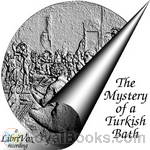 The Mystery of a Turkish Bath
The Mystery of a Turkish Bath
A group of guests, at an exclusive luxury hotel in Hampshire, are the witnesses of an illustration of occult powers, demonstrated by “the Mystery”, as Mrs. Jefferson named the beautiful stranger who one day appeared in the Turkish Baths of the hotel. The events that follow lead Mrs. Jefferson to question the wisdom of her interest in the occult. | |
By: Irving Bacheller (1859-1950) | |
|---|---|
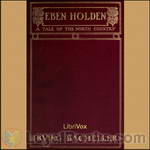 Eben Holden - A Tale of the North Country
Eben Holden - A Tale of the North Country
Eben Holden - A Tale of the North Country. Having lost both parents and his home in northern Vermont, orphan Willie Brower is taken in by Eben Holden, "Uncle Eb" who transports him westward to save him from being sent to an orphanage. Through the Adirondacks and into the St. Lawrence valley they travel. Eben is kind, happy, and loves to tell stories to the youngster, many of which were to shape the life and ideals of Willie during his life.This story follows Willie as a young orphan, later as a journalist, and finally as a soldier who enlists in the army at the outset of the American Civil War... | |
By: Rebecca Harding Davis (1831-1910) | |
|---|---|
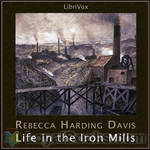 Life in the Iron Mills
Life in the Iron Mills
This 1861 novella was the first published work by Rebecca Harding Davis: writer, social reformer, and pioneer of literary realism. It tells the story of Hugh Wolfe, a Welsh laborer in an iron mill who is also a talented sculptor, and of Deborah, the hunchbacked woman who unrequitedly loves him. | |
By: F. Marion Crawford | |
|---|---|
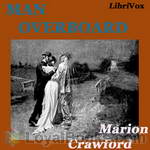 Man Overboard
Man Overboard
Peculiar happenings aboard the schooner Helen B. Jackson when one night during a storm, the small crew found themselves diminished by one. Somebody had gone overboard, and it was surmised that it was one of the twin Benton brothers. But oddly enough, it seemed that the ‘presence’ of the missing twin continued to exist on board during the following weeks. For example, one extra set of silverware was found to be used after each meal, but nobody claimed to be using them. What then did happen that stormy night, and which brother, if indeed it was one of the brothers, was the man who went overboard? | |
By: Mamie Dickens (1838-1896) | |
|---|---|
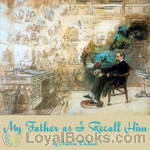 My Father As I Recall Him
My Father As I Recall Him
“If, in these pages, written in remembrance of my father, I should tell you, my dear friends, nothing new of him, I can, at least, promise you that what I shall tell will be told faithfully, if simply, and perhaps there may be some things not familiar to you.” So begins chapter one of My Father as I Recall Him, the personal recollections of Mary Dickens, (Mamie, as she was called), the oldest daughter of the great novelist, Charles Dickens. | |
By: Oliver Wendell Holmes | |
|---|---|
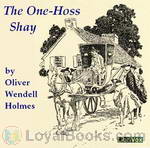 The One-Hoss Shay
The One-Hoss Shay
This is a small collection of whimsical poems by the American physician and author Oliver Wendell Holmes, Sr. "The Deacon's Masterpiece" describes the "logical" outcome of building an object (in this case, a two-wheeled carriage called a shay) that has no weak points. The economic term "one hoss shay," referring to a certain model of depreciation, derives its name from this poem. "How the Old Horse Won the Bet" is a lighthearted look at a horse race. Finally, "The Broomstick Train" is a wonderfully Halloween-y explanation of how an electric tram really works. | |
By: Oliver Wendell Holmes, Sr. (1809-1894) | |
|---|---|
 My Hunt After 'The Captain'
My Hunt After 'The Captain'
Holmes describes his frantic search through Civil War torn landscapes for his wounded son, the future Supreme Court Justice. Originally published in The Atlantic Magazine, 1862. Holmes, Sr. (1809 -1894) was an American physician, poet, professor, lecturer, and author. He was regarded by his peers as one of the best writers of the 19th century. His most famous prose works are the "Breakfast Table" series, which began with The Autocrat of the Breakfast Table (1858). He is also recognized as an important medical reformer. | |
By: Harry Leon Wilson (1867-1939) | |
|---|---|
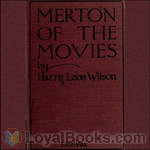 Merton of the Movies
Merton of the Movies
Merton of the Movies is a comedy that centers around Merton Gill, an aspiring dramatic artist from Simsbury, Illinois who makes his way to Hollywood to become a serious actor. How could Merton fail in attaining his dreams after finishing a correspondence course from the General Film Production Company of Stebbinsville, Arkansas, certifying him to be a competent screen actor? Harry Leon Wilson, the author, was a very popular humor writer in the first decades of the 20th century. This book was made into film several times, the last in 1947 starring Red Skelton. | |
By: Henry Adams (1838-1918) | |
|---|---|
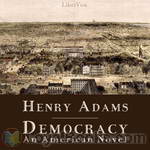 Democracy - An American Novel
Democracy - An American Novel
Not until after his death in 1918 was it revealed that Henry Adams was the anonymous author of Democracy, which had been published to great acclaim in 1880. Though the book avoids dates and the characters are fictitious, the setting is no doubt that of Washington in the 1870s, the age of Presidents Grant and Hayes. The young widow, Madeleine Lee, wealthy and independent, is the protagonist, who leaves her New York for Washington to turn her intelligence to politics and to see what makes her country tick... | |
By: Louis Tracy (1863-1928) | |
|---|---|
 The Albert Gate Mystery
The Albert Gate Mystery
A new case for barrister and hobby detective Reginald Brett: The imperial diamonds were sent by the Sultan to London, to be cut in Albert Gate mansion by experts, all the while under the especial protection of the British government. One morning, however, the Turkish officials are found dead in the house, and the diamonds have vanished - despite the strict measures taken to protect them. The first suspicion falls on Jack Talbot, a young secretary at the Foreign Office, in whose charge this mission was, because he also disappeared without a trace on the same evening. Convinced that Talbot is innocent, his friend Lord Fairholme turns to Reginald Brett for help... | |
By: Georg Ebers (1837-1898) | |
|---|---|
 Arachne
Arachne
Ledscha, living in ancient Egypt, has lost her betrothed and all hope of love. But the gods see otherwise. She now loves a Greek sculptor, who only wanted her for a model, but even that will not happen. She has been replaced by another woman for the statue of Arachne. Who do the gods see her with? Is it the Greek, or someone else? This work is the last written and published in German by Georg Ebers before he died in 1898. He wrote many novels set it ancient Egypt, which sparked the general interest in and popularity of Egyptology that still thrives today. This book was translated into English also in 1898. | |
 Joshua
Joshua
Hosea is a commander in Pharaoh's army... and a Hebrew. As he returns home from war, he finds that there has been a great pestilence in Egypt and his people are being blamed for it. Hosea receives a message from his father to follow his people to Succoth, but he is hesitant to give up his position in the army. Someone else also sends a message, containing a new name for him from God. There is much intrigue in this retelling of the Exodus, both among the Hebrews and in the court of Pharaoh. | |
By: Baron Ludvig Holberg (1684-1754) | |
|---|---|
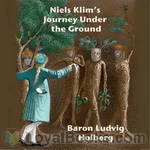 Niels Klim's Journey Under the Ground
Niels Klim's Journey Under the Ground
Niels Klim’s Underground Travels, originally published in Latin as “Nicolai Klimii Iter Subterraneum” (1741) is a satirical science-fiction/fantasy novel written by Ludvig Holberg, a Norwegian-Danish dramatist, historian, and essayist, born in Bergen, Norway. It was his first and only novel. It describes a utopian society from an outsider’s point of view, and often pokes fun at diverse cultural and social topics such as moral, science, sexual equality, religion, governments, and philosophy. | |
By: Frederick O. Bartlett (1876-1945) | |
|---|---|
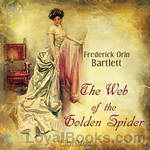 The Web of the Golden Spider
The Web of the Golden Spider
The Web of the Golden Spider is a tale of mystery, intrigue and adventure that begins in the city, progresses to a mutinous open sea voyage, eventually leading to the remotest areas on the slopes of the Andes of South America. Wilson, our hero, finds himself in the midst of a battle between a deposed queen and revolutionists who have banded together in an effort to bring their country together as a republic. Wilson, although torn between helping mercenaries, freedom fighters and revolutionaries, is more concerned with the rescuing of the girl he has fallen in love with, but who has been snatched from him by a mysterious priest... | |
By: Katharine Elizabeth Dopp (1863-1944) | |
|---|---|
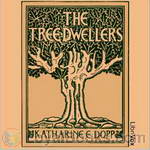 The Tree-Dwellers
The Tree-Dwellers
Katharine E. Dopp was well-known as a teacher and writer of children’s textbooks at the turn of the 20th Century. She was among the first educators to encourage the incorporation of physical and practical activity into the elementary school curriculum at a time when such activities were becoming less commonplace in a child’s home environment. The Tree-Dwellers – The Age of Fear is the first in a series of elementary school texts written by Ms. Dopp that focus on the anthropological development of early human groups... | |
By: Marcus Clarke | |
|---|---|
 For the Term of His Natural Life
For the Term of His Natural Life
For the Term of his Natural Life, written by Marcus Clarke, was published in the Australian Journal between 1870 and 1872 (as His Natural Life), appearing as a novel in 1874. It is the best known novelisation of life as a convict in early Australian history. Described as a “ripping yarn”, and at times relying on seemingly implausible coincidences, the story follows the fortunes of Rufus Dawes, a young man transported for a murder which he did not commit. The harsh and inhumane treatment meted out to the convicts, some of whom were transported for relatively minor crimes, is clearly conveyed... | |
By: John A. Joyce | |
|---|---|
 Shakspere: Personal Recollections
Shakspere: Personal Recollections
Recording of Shakspere: Personal Recollections, by John A. Joyce.A fictitious account of a "friend" of William Shakespeare, who accompanies him from his birth to his death and beyond, chronicling Shakespeare's life, adventures, speeches, and impromptu bursts of poetry. | |
By: Samuel Merwin | |
|---|---|
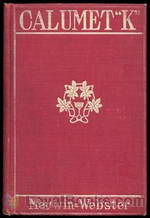 Calumet "K"
Calumet "K"
"A novel, with several elements of rather unusual interest. As a tale, it is swift, simple, and absorbing, and one does not willingly put it down until it is finished. It has to do with grain-elevator business, with railways, strikes, and commercial and financial matters generally, woven skilfully into a human story of love." --The Commercial Advertiser "'Calumet "K"' is a novel that is exciting and absorbing, but not the least bit sensational. It is the story of a rush.... The book is an unusually good story; one that shows the inner workings of the labor union, and portrays men who are the bone and sinew of the earth... | |
By: Ernest William Hornung (1866-1921) | |
|---|---|
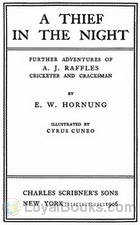 A Thief in the Night
A Thief in the Night
Gentleman thief A.J. Raffles burgles his way through a series of homes in late Victorian England. A Thief in the Night is a short story collection and Hornung's third book in the Raffles series. | |
 Mr. Justice Raffles
Mr. Justice Raffles
A. J. Raffles is a British gentleman thief of some renown who, in this, the hero's final adventure, ironically demonstrates a sense of morality by teaching a London East End loan shark a lesson. The book was later made into a movie, as well as a British television series. | |
By: Olive Schreiner (1855-1920) | |
|---|---|
 The Story of an African Farm
The Story of an African Farm
The novel details the lives of three characters, first as children and then as adults - Waldo, Em and Lyndall - who live on a farm in the Karoo region of South Africa. The story is set in the middle- to late Nineteenth century - the First Boer War is alluded to, but not mentioned by name. The book is semi-autobiographical: in particular, the two principal protagonists (Waldo and Lyndall) display strong similarities to Schreiner's life and philosophy. The book was first published in 1883 in London, under the pseudonym Ralph Iron... | |
By: Lord Dunsany (1878-1957) | |
|---|---|
 Fifty-One Tales
Fifty-One Tales
Very brief, well-crafted stories, many having surprise endings, all steeped in the dye of myth and calling to every reader's neglected imagination. | |
By: Lord Dunsany (1878-1957) | |
|---|---|
 Dreamer's Tales
Dreamer's Tales
"A Dreamer's Tales" is the fifth book by Irish fantasy writer Lord Dunsany, considered a major influence on the work of H. P. Lovecraft, J. R. R. Tolkien, Ursula K. Le Guin, Michael Moorcock and others. "A Dreamer's Tales" is a collection of sixteen fantasy short stories, and varies from the wistfulness of "Blagdaross" to the horrors of "Poor Old Bill" and "Where the Tides Ebb and Flow" to the social satire of "The Day of the Poll." (text from Wikipedia articles on Lord Dunsany and "A Dreamer's Tales") | |
 Don Rodriguez: Chronicles of Shadow Valley
Don Rodriguez: Chronicles of Shadow Valley
| |
By: Thomas Frost (1821-1908) | |
|---|---|
 In Kent with Charles Dickens
In Kent with Charles Dickens
By his own admission, Thomas Frost found it hard to make a living from his writing, and no doubt he used the name of Dickens in the title of this book to boost sales. Frost tells a good tale, and the book is not only of interest to enthusiasts of Dickens and the county of Kent.He includes some of Dickens’ own descriptions of locations, as well as regaling us with anecdotes about towns and villages which he visits, including an account of the last armed rising on British soil – the Battle of Bossenden Wood... | |
By: Ben Ames Williams | |
|---|---|
 All the Brothers Were Valiant
All the Brothers Were Valiant
Joel Shore, newly appointed captain of the whaling ship Nathan Ross following his brother’s apparent demise as captain of the same ship, elects to make his first cruise as captain to the very location where his brother had last been seen – the Gilbert Islands, in order to try to learn more about what happened to his brother. The focus of this tale is of that voyage halfway around the globe and the adventures which he and his crew encounter. | |
By: Clarence Day, Jr. (1874-1935) | |
|---|---|
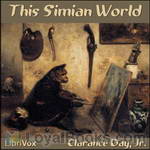 This Simian World
This Simian World
Clarence Day, Jr., best known for his work Life with Father, presents a satirical speculation on how the world might be different if we apes had not risen to prominence, but rather one of the other species had become dominant in our place. | |
By: Lucy Fitch Perkins (1865-1937) | |
|---|---|
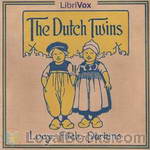 The Dutch Twins
The Dutch Twins
The Dutch Twins are Kit and Kat, 5 years old and not yet big enough to be called by their real names, Christopher and Katrina. They live in a typical Dutch household, around the turn of the last century. The book follows their day-to-day adventures and accidental mishaps. The book is the first of a series of stories about twins in different countries, meant to give children an idea of life and customs in various parts of the world. | |